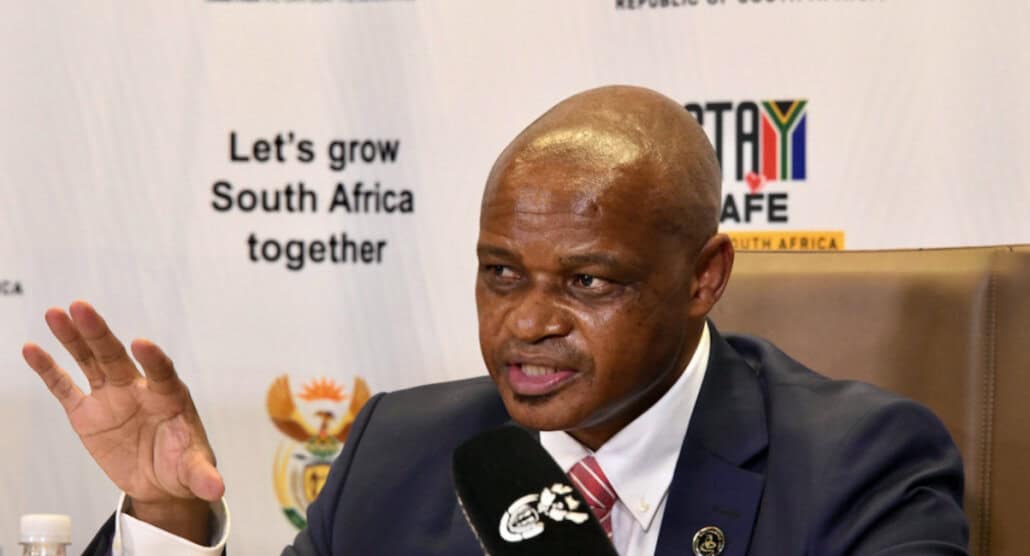Image: Flickr/GovernmentZA
By Jeff Wicks
First published on News24
Special Investigating Unit (SIU) head Andy Mothibi says corruption in government procurement has grown so rife that billions of rand are stolen – often at a rate faster than they can be recovered.
In an exclusive interview with News24, Mothibi said crooked service providers had “perfected” their modus operandi and were exploiting deficits in the system.
The modern criminal, he held, had become adept at corrupting state officials and functionaries – and, when his graft-busting squad descended, they faced an onslaught of attacks and threats of death.
“When they realise that we are uncovering what they have done, things become dangerous and often lethal,” Mothibi said, adding that white collar crime had become intertwined with organised syndicates who did not hesitate in targeting whistle-blowers and investigators.
“We are always alert … we can never lower our guard at any time.”
Bringing back billions
Mothibi has been at the helm of the SIU for nine years, introducing key reforms and focus areas that have seen nearly R137-billion – extracted via tainted tenders and contracts – returned to the public purse.
Moreover, R54-billion in potential future losses were prevented when syndicates were dismantled and their dubious tenders set aside.
Among the changes were a strategic reorientation of the organisation, to steer its more than 700-strong staff complement in a direction that would create the most impact against corruption. An operating value chain was defined, a case-monitoring system was put in place, a whistle-blowing hotline was established and the Special Tribunal – a dedicated court to bypass busy High Court rolls – was resuscitated.
But still, they are inundated with proclamations that set them against state departments across the country.
“While we continue to come up with results, you know, it (graft and corruption) just doesn’t seem to stop … at times it is frustrating, yes, but we are not going to tire because of that.”
Disjointed
Mothibi said corruption had become intrinsic, at least in part, because of the disjointed response of law enforcement agencies. A dearth of convictions meant the bent operated with a sense of impunity.
“When these perpetrators continue to be of the impression that they can act with impunity, we will not see the end of this,” he added.
“There’s this belief that the [law enforcement] machinery is not consistent in consequence management. If the whole justice system is not working appropriately, you can recover money and assets they’ve stolen, but they will walk the streets free. That’s not justice.”
Extraction schemes, well-hidden and most often with the collusion of government officials, were difficult to unravel, requiring cyber investigations, forensic accounting and data analytics, all of which took time.
“These days, criminals or the corrupt have perfected their methods, including the way they hide their assets … we have seen them get very creative.”
Ninety-nine percent of all the cases that landed with the SIU were from the procurement and supply chain space. One of the deficits in the procurement system that allowed for it to be corrupted was it was largely paper-based, with pushback against modernising it.
“There’s pushback when you want to automate and make the supply chain management process transparent … and this becomes understandable because those people, both inside and outside of the state, are taking advantage of a broken system,” Mothibi said.
“The National Treasury, now having experienced the vulnerability of the supply chain management process and system, have sought to change legislation, with the new procurement Bill, which we are confident will bring about positive interventions,” he added.
Fragile
But a key frailty near impossible to mitigate was collusion from within.
“The human element is the big contributor,” Mothibi said, adding the only way for them to turn the tide was a complete reshaping of how the state spent tax rands and emphasised the need for a transparent process, even in the face of resistance.
“The will at all levels, political, administrative and law enforcement, is needed to make changes. If the system can work, and work as we envisage, I’m telling you, we are going to see a reduction in this scourge.”
Mothibi, for his efforts, does not move in public without armed guards, because of death threats.
“Living this way is difficult – but, you know, it’s the call that we responded to. We continue to do our best while, of course, being ever watchful of any threat of life,” he said.
“Sometimes, when I speak to my mother, she says to me that maybe I have done my service. Because she knows about the risky terrain … it’s scary sometimes. But, for me, it’s a calling … and our work is not yet done.”
These threats of death often extended to his investigators and whistle-blowers, with the SIU forced to intervene to assure their safety.
“A lot of our investigators have been with us a long time and I believe that, for them, it is a similar calling. They don’t leave because they know the work is important and because they know how destructive corruption would become if we did not act,” Mothibi added.
The threats to the SIU, as an institution, included orchestrated cyber-attacks to penetrate its systems.
“ICT is an area where we have had to invest a lot of money to protect ourselves. Every month, our staff show me the reports and say, these are the attempts at incursion that we have managed to ward off.”
Looking forward, and talking about what needed to change, Mothibi said the rollout of the National Anti-Corruption Strategy and National Corruption Prevention Framework would represent a change for the better.

